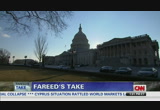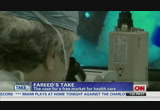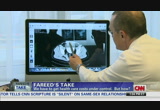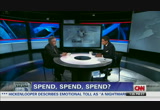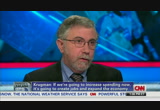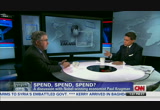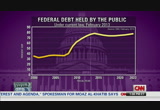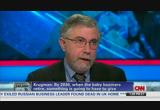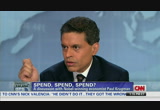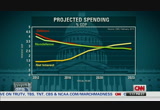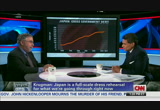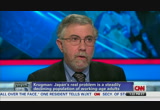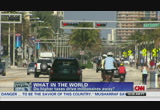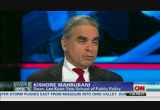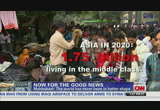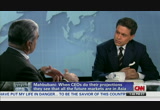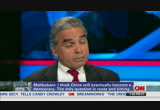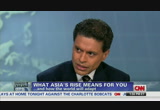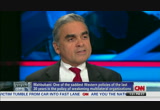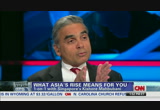tv Fareed Zakaria GPS CNN March 24, 2013 10:00am-11:00am PDT
10:00 am
in fact, you're against it. >> i am absolutely against a ban on same sex marriages because -- >> even if your voters -- >> because they are simply unconstitutional. and it is one thing to read the polls, which we have discussed which show again that a majority of americans are in favor of same sex marriage. but it is more important to read the constitution. and the constitution of the united states dictates, i believe, under every court precedent that we have discussed in terms of describes marriage as a fundamental right that the same sex couples that are before the united states supreme court, mrs. windsor, miss perry, be allowed to have equal protection under the laws as any americans when it comes to their ability to join themselves with their loving partners in marriage and raise their children. and 61% of californians are in favor of same sex marriage. >> yet the last time they voted they voted against it. so it gets kind of complicated here. because you have, you know,
10:01 am
voters saying we don't want that because of the way california actually sets things up generally. >> well, 61% of californians are in favor of same sex marriage. and i believe, again, because it gets back down to a very simple notion of fundamental rights. fundamental concepts of justice. fundamental concepts of liberty. i will tell you, candy, we have 50,000 children in california right now who are asking why can't my parents be married too? >> let me let you get the last word in here about this. where do you see this debate going? >> i see the debate continuing well beyond this supreme court decision. the supreme court is no more going to decide the question of marriage than it decided the question of abortion. americans are going to continue to debate this important issue. that's why we need to leave it to our democratic institutions. if 61% of californians want same sex marriage, they have the right and should have the right to use their democratic
10:02 am
constitutions, their legislature and the ballot box to achieve that political result. we don't need the supreme court dictating that to all 50 states. and that's what's at stake in this case. and i think most fair minded americans agree with that proposition. my thanks to kamala harris and austin nimocks, thank you for being here. and camilla, i know you're going to stay with us for our next section. thanks. if you missed any part of the show you can buy it on itunes. fareed zakaria gps. this is gps, global public square. welcome to all of you in the united states and around the world. i'm for a reek zakaria. we have a great show today. first up, the question for the american economy. should we save or spend? what will get the economy moving
10:03 am
faster. i will talk to the chief pro-economist of spending paul krugman and then the race for space, is america losing? china is building it own space station and the u.s. has to reeli on russia to send our astronauts to the stars. what's going on? and the exploding issue, middle class. in seven years it will more than triple in size to almost 2 billion people. it will change the world. we'll talk about how. but first here's my take. those of you who followed the show regularly know that i have long argued that cutting government spending if the midst of a weak recovery is not a path toward growth. i have also argued that america has a debt and deficit problem and we need to take it very seriously. the fact is that the vast majority of our problem is related to the cost of health care in america. now the debate over obama care is over, we should start to think seriously of how to get america's health care costs
10:04 am
under control. as it turns out a book and magazine story provide ways to think of this. the central debate between republicans and democrats is over whether the free market works well in health care. in a new book catastrophic care, they make the case arguing people need ito become consumers of health care so they, not insurance companies or the government, actually see, feel and pay the bill. that will force producers of health care, doctors and hospitals to push down prices and drive up quality. that's what happens with groceries, tv sets or computers. and basic surgery has seen a 90% drop in price and increase in quality since it was introduced in the '90s. that's what happens when consumers pay for a product. steven makes the opposite case in a recover story in "time" magazine.
10:05 am
he painstakingly went through the actual bills that hospitals put out and found they charge massively for routine procedures and medicine. he found for example a routine blood test was billed to patients at a hospital at the rate of $199.50. medicare pays for that same test $13.94. he agrees that the health care industry is not a real market but for different reasons than many on the right. he says there is so much confusion, so many monopolys and disinformation it cannot function as one. most important, he says, is that the consumer when buying health care simply does not have the power to act as he or she does in other markets. when a doctor tells you need a ct scan, you are unlikely to say, no, thanks or to start haggling over the price.
10:06 am
i think we should read both. there are some points of agreement about how to reform what everyone accepts is a badly functioning almost crooked marketplace for health care. goldhill thinks the government has a role to play. is so this is not an argument for the poor to fend for themselves. my own views are open. i want to read more and understand better what seems to be working in cutting costs and improving quality across the country and the world. but i do think that steven bril points to a real problem in health care as a market and these are inherent in the nature of health care can. the consumer does not have the knowledge or the power to act as he or she does in other markets. that's why in every other rich country in the world we have found that markets don't function properly in health care and that includes free market nations like singapore. both of which score higher than the united states in the heritage foundation index for
10:07 am
economic freedom and yet all of them provide universal health care at much, much lower costs than we do with much better health care outcomes than we have. let's get started. should the american government just spend, spend, spend and spend some more and not worry about the deficit? paul krugman has the idea that deficits don't matter, not now. we spent some time understanding the thinking behind the theory. krugman is of course the nobel prize winning op-ed columnist for the "new york times." he is also princeton professor. thank you for doing this. so explain, first, specifically why you feel that right now really there is, as far as i can
10:08 am
tell, almost no limit to what you would be willing to do in terms of stimulating the economy. >> right now is a time when not spending is extremely disruptive. if the government pulls back, it's destroying jobs and there's no way to offset that. ordinarily if a government spends less the federal reserve can cut interest rates, like we did at the end of the cold war, but we can't do that now because the interest rate fed controls are at zero. so we have no offset and conversely up to, if we increase spending right now it will create jobs and expand the economy. this is a really good time to be spending. won't always be like this. this is not the normal situation. normally we have an economy that is operating at full capacity, the fed is raising rates to offset the risk of inflation. in which case, we have a lot of -- we can offset any change in the spending. in fact, we will have to because increase of spending a normal
10:09 am
time like in 2000 or 2007, the fed will raise rates and it is not helpful but this is not that kind of time. and we have basically a depressed economy is a time when there are the private sector wants to save more than invest. we are basically a wash in desired savings with no place to go. so having the government borrow those pernt up useless savings and putting them to work is good for everybody. >> what do you say to people who say the traditional mechanism doesn't seem to be working because if you look at the amount the government has spent -- i know you think the stimulus was not large enough but it was fairly large, certainly by historical language. we went from 40 to 70, 80% and the argument is the weakst recovery since the great depression. is that proof that this kind of
10:10 am
stimulus doesn't work in today's economy? >> no because it is what you would have expected to happen. this is one hell of a financial crisis. worse than the great depression. exactly. we have had a huge fall in prices, housing bubble, rise in private savings and households trying to pay down debt. of course you have to run large budget deficits to stay in place. you don't expect it to be enough to produce full employment. >> when people look at the -- there are people who you call deficit spenders. let's look at the first chart. you have a long-term problem here. even if you -- you can stabilize debt, what will happen because of essentially the aging of the population and health care costs is our debt to gdp ratio will stay very, very high n the 70 to 80% of gdp and could go higher.
10:11 am
>> could go higher. but, there's two different questions. one is what does the fairly near term, even the next ten years look like. the debt ratio will rise. we'd like less debt but no crisis. the markets don't think there is a crisis because we can borrow money cheaper. >> that's right. >> let's go to the year 2030, something is going to have to give. 2030, all of the baby boomers will have to retire, medical and social security will be expensive. in health care costs continue to rise which they probably will, they will hopefully bring them somewhat under control, something will have to give. we will have to find spendings or additional revenue i but why do we have so solve that problem now? what does that have to do with our spending in 2013? no one has ever given me 0 a good answer on that. >> i think the answer is twofold. one if you are going to make cuts in entitlement programs you need to give people time to plan
10:12 am
for it. if you are telling somebody who's 45 years old, when you get to be 65, the world will look different and your benefits of will look different. they have 20 years to plan for it but many of the changes, these reforms are complex, particularly in health care and you want to try them out and figure out whether they work. for both of those reasons you don't want to tell somebody who's 64, by the way, next year your benefits will be down 30%. >> that's a very much weaker argument. usually hear people say, well, we are uning up debt and can't afford this stuff. that's not the issue. now you are saying there are administrative and planning issues that mean if you are going to have lower benefits in 2030 we should let people know some ways in advance. that's not a compelling case why it has to be settled right now. and particularly health care costs is the biggest issue we should be trying pilot programs, different ways to control health care costs. guess what? we are doing that. there's a lot of that stuff in
10:13 am
the affordable care act. it is important to understand that there is a lot of ill logic going on. if we don't do something we will have to cut benefits in the future. in order to avoid that we have to commit ourselves to future benefit cuts and that doesn't make any sense at all. the things you are talking about are real but they are second order compared with the issue of fighting unemployment right now. >> we will be back in a moment. more with paul krugman. interest rates record lows. they have nowhere lower they can go and does it means at some point they have to go up and what does it mean to paul krugman's theories then? i will ask him. verify and lock. command is locked. five seconds. three, two, one. standing by for capture. the most innovative software on the planet... dragon is captured.
10:14 am
10:15 am
license and registration please. what's this? uhh, it's my geico insurance id card, sir. it's digital, uh, pretty cool right? maybe. you know why i pulled you over today? because i'm a pig driving a convertible? tail light's out.. fix it. digital insurance id cards. just a click away with the geico mobile app.
10:17 am
...and we inspected his brakes for free. -free is good. -free is very good. [ male announcer ] now get 50% off brake pads and shoes at meineke. we are back with paul krugman, columnist for the "new york times." we are digging in to the theory the federal deficit doesn't matter this the short term. what matters is spending. the u.s. government should spend to spur growth. let's look at interest rates. >> yes. >> a lot of projections when they go forwarded are assuming that interest rates will stay low. if you look at the ten-year treasury yield over the '90s averaged 6%.
10:18 am
the last seven, eight years, 4%. it is currently less than 2%, as you know. >> right. >> the possibility of interest rates staying as low as they are now is highly unlikely, and that as interest rates rise, yes, the economy will recover but the interest payments on the much larger debt become crushing. >> a couple of things there. first of all, as long as the economy remains weak interest rates will remain low. if the economy gets stronger interest rates will go up but also if the economy gets stronger we will have more revenue and then i start to become a deficit hog. by no means am i saying we have to stay in this expansion mode under all reasons. the idea that we will be facing higher rates is belied by history. look at japan. they have been running deficits
10:19 am
twice the debt burden that we have. still low interest rates. it's not a story that you should place a lot of weight on. by the way, the projections right now, about what the interest burden on the federal budget will be in the year 2023, they say it will be as high as it was in 1991, 1992. we actually had interest payments over 3% of gdp under bush one and then came way down. so when people say look at the scary numbers about rising interest payments, the scenario we are supposed to be afraid of are the things going back to the way they were 20 years ago which doesn't seem all that scary. >> let's look at. that we have a chart with precisely that. this is the net interest payments and this is assuming fairly modest rate increases. what you see here is nonentitlement spending.
10:20 am
you see how they come down. what i want to ask you, as a liberal, don't you worry that if entitlements continue to go up and nothing is done about it what is going to happen is forget about defense but look at nondefense discretionary spending. this is education, spending all of the programs that you are passionate about that will be squeezed as entitlement spending is larger and larger. >> they will be squeezed. if we look beyond, look at 2025, 2030, something has to give. we can't keep squeezing nondefense, ndd, nondefense discretionary. that is already pret itty tight. so something will have to give. some combination of higher revenues, finding ways to save on entitlement. not necessarily benefit cuts but ways to save money on
10:21 am
entitlements. use the bargaining power of medicare, fine. that's worth talking about but not a reason to not do deficit spending to support the economy now. >> the argument would be, and this is the argue made by bob rubin and many others that do some stimulus spending but put in place a long-term plan to ensure the markets that you have a plan. you are not hostage to fortune in case interest rates spike suddenly. off process in place that allows it to happen and don't get hemorrhaging of nondefense. >> i'd like to me see men and women of goodwill come together and produce a long term-term solution. i'd like to also see world peace and marriage equality. the trouble is it is not going
10:22 am
to happen in the current environment. we have a debate as the sequester unfolded you have republicans saying this is terrible. it will open us up. it is serving iranians but not a penny tax increase. but in that environment it is unrealistic thing to expect a grand bargain and we don't want to hold short term policies hostage to have a grand bargain i'd love to see but isn't going to happen right now. >> this last graph is about japan. you brought it to my attention. you wrote a book at about the japan economics and the -- >> that's right. >> japan is the full-scale dress rehearsal for what we are going through now. people studying japan in the '90s were dreading what happened. >> if you look at japan, one thing you say is when you look at japan now you are glad the japanese central bank is finally
10:23 am
doing something. you often argue that japan didn't do enough in terms of stimulus. i want to show you japan's debt to gdp. i guess if this isn't enough, than what is? look at what they spent, it paved every roadway and highway that you could find and it went from 60% debt to gdp to 250% and still it didn't. >> be careful here because that's is gross debt and the central bank is a smaller number actually. >> i have seen the debt numbers. >> it is still under 40 smog still rather large. the answer, two-part answer. one is that the japanese dribbled the stuff out. there was never a big push. what japan needs to do is get out of deflation. to do that they have to have a period of strong fiscal similar lus followed by monetary policy
10:24 am
which is what they are about to do now but it will be he first time. and the other thing is japan situation is inherently more difficult ours. low fertility rates, cultural aversion to immigration. if you look at the growth per adult it is not bad. over the past 20 years they have done as well as we have in terms of growth per working aged adult. they have a steadily declining working age of adults. >> you are confident if we went up on this scale we would actually stimulate the economy and get it on a to a permanently higher output level than japan? >> yes. there's no certainty in life but everything i can see in the numbers and the historical experience says if the united states had a period of strong fiscal stimulus, accommodated monetary policy that we could get back to sustain prosperity. you can see a virtuous circle
10:25 am
building in the u.s. economy right now. the housing is starting to recover. the main thing holding housing back is young people aren't moving out and starting families because they can't find jobs. they are staying with their parents. if we get improving jobs, improving housing, means more jobs. all of which will kick in to place unless we screw it up by austerity. >> paul krugman, pleasure as always. >> up next the quintessential french actor may soon no longer be french. in the world is up next. ♪ it was the best day yeah! ♪ it was the best day ♪ because of you [sigh] [echoing] we make a great pair. huh? progressive and the great outdoors -- we make a great pair. right, totally, uh... that's what i was thinking. covering the things that make the outdoors great.
10:26 am
now, that's progressive. call or click today. a regular guy with an irregular heartbeat. the usual, bob? not today. [ male announcer ] bob has afib: atrial fibrillation not caused by a heart valve problem, a condition that puts him at greater risk for a stroke. [ gps ] turn left. i don't think so. [ male announcer ] for years, bob took warfarin, and made a monthly trip to the clinic to get his blood tested. but not anymore. bob's doctor recommended a different option: once-a-day xarelto®. xarelto® is the first and only once-a-day prescription blood thinner for patients with afib not caused by a heart valve problem, that doesn't require routine blood monitoring. like warfarin, xarelto® is proven effective to reduce the risk of an afib-related stroke. there is limited data on how these drugs compare when warfarin is well managed. no routine blood monitoring means bob can spend his extra time however he likes. new zealand! xarelto® is just one pill a day, taken with the evening meal.
10:27 am
and with no dietary restrictions, bob can eat the healthy foods he likes. do not stop taking xarelto® rivaroxaban without talking to the doctor who prescribes it for you. stopping may increase your risk of having a stroke. get medical help right away if you develop any signs or symptoms of bleeding, like unusual bruising or tingling. you may have a higher risk of bleeding if you take xarelto® with aspirin products, nsaids or blood thinners. talk to your doctor before taking xarelto® if you currently have abnormal bleeding. xarelto® can cause bleeding, which can be serious, and rarely may lead to death. you are likely to bruise more easily on xarelto®, and it may take longer for bleeding to stop. tell your doctors you are taking xarelto® before any planned medical or dental procedures. before starting xarelto®, tell your doctor about any conditions, such as kidney, liver or bleeding problems. ready to change your routine? ask your doctor about once-a-day xarelto®. for more information including cost support options, call 1-888-xarelto or visit goxarelto.com.
10:29 am
segment. it is not every day you see russia's putin receiving a bear hug from a frenchman but gerard depardieu is no ordinary frenchman and he may not remain french for very long. you see, gerard depardieu has been threatening to give up his french passport, especially now that putin handed him a new russian one. why would he or anyone for that matter want to leave france? think of the food, the wine, the
10:30 am
countryside? for gerard depardieu it comes down to taxes. over francois hollande they have been weighing a proposal for a 75% marginal tax rate and russia offers a flat 13% tax. moving to tax havens is not new or a foreign concept. in america, a number of high earners move between states to save on taxes. the golfer phil mickelson rerecently threatened to leave california after the golden state raised the top income tax by three percentage points. tiger woods already did that years ago, moving to florida. in fact, many american retirees move to florida or texas, neither of which get much snow but perhaps even more enticing, neither collect state income taxes or estate taxes. so is it counter productive to raise taxes on millionaires? does it drive high earners away? a number of studies address the question. two economists, christopher
10:31 am
young of stanford and charles varner of princeton recently examined the case of new jersey which raised the top tax rate in 2004. anyone who was making more than $500,000 was subjected to an extra 2.6% in taxes. so what happened? well, as you would expect there was an increase in the number of millionaires that left the garden state n. 2006, that loss ended up costing new jersey a grand tote al of $16.4 million in foregone levies, but get in the overall gains from higher taxes on the rich came in at 65 times that number, more than a billion dollars. why? well, in part the sheer number of millionaires increased an the vast majority of high earners did not leave. many had jobs or businesses that were tied to the state. other studies on california and maryland show similar finding. we have link to them all on
10:32 am
cnn.com/fareed. i am not recommending higher taxes on rich people but it is important to show the fact we think that california or new jersey made a mistake because high-profile celebrities threatened to leave the state but the facts show this is more complex. you can question the policy, but not the numbers. taxes the rich, so far least, clearly generated more than produced losses. this is true up to a point of course. what about taxes around the world? do people move from high tax to low tax areas? the data isser more difficult to glean there. i couldn't help but wonder as i watched gerard depardieu show off his new passport russia, he needed to spend six months of the year to qualify for the 13% tax rate and deal with russia's frigid winters, battle with a culture that is not always friendly to foreigners, trade french food for russian food and
10:33 am
10:37 am
hello. i'm fredricka whitfield with a look at the top stories. a spring snowstorm is pounding kansas, missouri and illinois they are buried under six inches of snow and expected to get four inches more before it is over. the storm is moving east and will hit the mid-atlantic states late today and tomorrow. tv ads against gun violence start to run in 13 states beginning tomorrow. new york mayor and billionaire mike bloomberg is bankrolling the ad. the campaign is ahead of a key vote in the senate on gun control. the national rifle association says they are trying to intimidate senators. someone in new jersey just got $338 million richer. one ticket sold in that state
10:38 am
matching all six numbers in power ballotry last night. they will hold a conference on monday to hold details where the ticket was sold and how many people have their hands on that ticket perhaps. all eyes on the u.s. supreme court as justices take a look at proposition 8 and the defense of marriage act this week. we will break down the legal issues in the 2:00 eastern hour and what it means to you. i'm fredricka whitfield. around the world countries are pouring money in to space, russia, china and india are advancing space programs but here in the united states the opposite is happening. there are no plans to launch astronauts from american soil in american crafts for a decade. why and what are the larger implications i'm joined by a man who knows and cares deeply about
10:39 am
the issue. neil degrasse tyson, the director of the hayden planetarium. he as a new book out space chronicles facing the ultimate frontier. >> paper back. >> paper back edition. >> what i was struck by. >> now that meteors are hitting, don't stay struck, what you were surprised by. >> what i was struck or surprised by was that we all know that china is making a push and even india but canada is the new space nation. what's this about? >> consider, first that canada played a major role in the space shuttle program. they are the arm that lives inside the payload bay of the space shuttle called the canada arm. the flag is proudly displayed. so can can canada has fought
10:40 am
long and hard. and had many astronauts go up and we shouldn't be surprised they want to take the next steps on their own and other nations of the world saw what level of pride and the way in which it pumped vision statements of what a tomorrow would be for their country. they saw what effect it had on and now previously third world countries and other developing countries are -- they want to participate in thcapacity to create their own future and there's no way better to do that. >> they are doing it at the time we are losing faith -- >> we are not completely rolling back. there is a plan to go back in to deep space and mars but the timetable is decades as your opening remarks commented. right now we don't have a spaceship to take us anywhere.
10:41 am
we are buying seats on the russian soyuz to get to our own space station or the space station that we assembled, the international space station obviously. it's a little embarrassing. i'm more impatient than that. i'd rather see space advances happen on a time scale that matters to every generation that is thinking about what they want to be when they grow up. we saw what impact it had in in the '60s. you had to beat people back from the door that wanted to take science and engineering. you can take that talent and apply it to something worthy of your investment in time and energy. >> you think it is fair to say the push to the moon, interest in nasa all in some way led to the computer and information revolution. >> there are people that say that would have happened any way. there are certain facts that are undeniable. the search to minimize
10:42 am
electronics. no one was saying, i want to carry a tv in my hip pocket. it is a nonthought. when you launch something this to space, electronics of any matter, weight matters. it is costly to put it in to orbit. the minturization of electronics got a jolt of interest by the early space age. then once you see it is miniaturized, all of a sudden a new world of consumer electro c electronics opens up that was unimagined and dreamt of bmplt so, yes. in the urge to find an economic justification is honorable but not the biggest reason to do this. the reason is the culture it innovates foosters an invasion nation. everyone is thinking about it. innovation becomes just what you do.
10:43 am
i don't know that you can put a price tag on that. >> if you had your drut erand create one project that would excite the imagination of the american people what would it be? >> it wouldn't be one project. you say nasa take me anywhere i want to go in the solar system and they would create a lunch vehicles so scientists could go to mars or tourists to the moon and the miners want to go to the asteroid and the solar system becomes a our backyard and every track will have a frontier associated with it. you need biologists looking for life and the economists and the structural, mechanical engineers, the stem field that everyone is wailing about trying to improve, that would be part of the activity and you wouldn't need a program to convince people that s.t.e.m. fields
10:44 am
would be goothd god for the cou. >> neil degrasse tyson always a pleasure. >> thank you very having me. >> when we come back, what happens to the global economy when the middle class more than triples in size to almost 2 billion people. that will happen in under seven years. hey, buddy? oh, hey, flo. you want to see something cool? snapshot, from progressive. my insurance company told me not to talk to people like you. you always do what they tell you? no... try it, and see what your good driving can save you.
10:45 am
you don't even have to switch. unless you're scared. i'm not scared, it's... you know we can still see you. no, you can't. pretty sure we can... try snapshot today -- no pressure. ♪ ♪ the new blackberry z10 with blackberry hub and flick typing. built to keep you moving. see it in action at blackberry.com/z10
10:46 am
10:48 am
>> we all no asia is on the rise. he served as singapore's foreign secretary and the dean of the country's school of public policy. he has a new book out "the great convergence, asia, the west and the logic of one world." welcome back. you start the book with good news. since everybody in the united states and the west has been feeling blue, tell us what the good news is with and why we should be happy. >> actually i'm surprised by the kind of level of posseessimism europe and america. the world has never been in
10:49 am
better shape if you look at the view. the number was dying in dying in conflicts is the lowest it has ever been. in term of global poverty the only u.n. goal is having more than having by 2015. and the middle class, and this is a really stunning news, if you look at where asia is today, they are 500 million people living in middle-class living standards today in 2013 in asia. by 2020, which is seven years in now, the number will explode from 500 million to 1.75 billion. an increase of 3.5 times in seven years. we've never seen this before in human history. that's going to change the chemistry of the world and create more positive glow around
10:50 am
the world. >> so you will go from 500 million to 1.75 billion people in the asian middle class. so this asian middle class will now, in a sense, dominate the world economically, politically, culturally. >> in terms of economics, if you run any kind of major corporation, anywhere in the world and looking for markets and this is what ceos tell me from time to time that they do all of their projections and the future markets are in asia and inevidentably it is one of the largest markets for cultural products. the political theory, the one i'm most uncertain about and that's why i wrote this book at this point in time to tell the west that now is your moment to
10:51 am
construct a world order in which you approach becoming number two you put in all sorts of safe guards to ensure the world is a better place for you when you are number two. that's why the west needs to demonstrate wisdom now as it manages the rise of asia. if it doesn't demonstrate wisdom now it will create a more difficult world for itself. my book is intended to help the west to prepare for this new world. >> the middle class here will be china. one thing historically that has happened is when you have a rise of the middle class, countries are more democratic. do you think china will become a democracy? >> i think eventually china will be a democracy. the question is not in doubt but it will not be democratic in the near future. by the way, one point people forget. if you go to chinese universities and talk to bright, young chinese and ask you like to get rid of the communist
10:52 am
party and become democratic tomorrow most of them will say no because they know the chinese communist party over the last 30 years, the fastest growth in standard of living and know if you dismantle this, but all of their dreams of becoming number one this the world china falls their dreams of becoming number one in the world will disappear. you talked about nationalism earlier, the feeling that they're almost there, the feeling that they're going to become number one very soon is a very powerful driving force that's also keeping thel together. >> you talk about how the world is coming together, the rise of middle class in asia joining up with the middle classes in europe and the united states. sort of economically, socially, there is this convergence. the part you're worried about is politically. you think that we have a very strong, if you will, international society, but very weak govern nance at that
10:53 am
international level? >> yes, and it's a pity, you know, as you know, one of the saddest and most unfortunate western policies of the last 30 years, which may have had some logical sense 20, 30 years ago, but makes no sense today, is the western policy of weakening multilateral organizations. i argue very strongly in this book that actually now is the time for the west to change course. and i begin, as you know, by quoting bill clinton in a speech he gave in yale in 2003 where he said america assumes it will be number one forever. please continue doing whatever you're doing, it doesn't matter because you'll be number one forever. but if you can conceive of the possibility of becoming number two, surely, it is in america's interest to create a world space order that will then constrain the next number one. that's very wise of bill clinton to say that.
10:54 am
i'm sorry he didn't follow it up by pushing hard for it, but my book builds on that wisdom and insight of bill clinton that now is the time for america and the west to create a world space order that will constrain any rising powers anywhere in the world. >> some of the practical suggestion sas are things like new security council with 777 members. what is the chance of this happening when you look at the reform? you were once singapore's ambassador to the u.n. you know when people tried this, tried to get india, china vetoes. you try to get brazil on, the mexicans get upset. you take on nigeria, the south africans get upset. it's never going to happen. >> you're absolutely right. that's precisely the problem that for every japan, there's a south korea that says no. which is why i created seven permanent members, suggested the creation of seven permanent
10:55 am
members and seven siemipermanen losers, the mexico, south korea, actually become winners in the new formula because they get an automatic seat in the security council. that's a remarkable improvement for countries that have to spend millions of dollars to try to get re-elected back to the security kournl every four years. now i'm saying you have a seat. it's a win-win-1 formula for the small states, the middle powers and great powers. at the end of the day, eventually, not right away, the 7-7-7 formula can break the current log jam in security council reform. >> the great thing about the book is there's a lot of insight at 30,000 feet and also a lot of insight at the ground level because you have lived through these processes. pleasure to have you on. >> my pleasure. thank you for having me on. when we come back, the story of the world's most innovative city. it's not london or singapore. you will be very surprised. hey.
10:56 am
they're coming. yeah. british. later. sorry. ok...four words... scarecrow in the wind... a baboon... monkey? hot stew saturday!? ronny: hey jimmy, how happy are folks who save hundreds of dollars switching to geico? jimmy: happier than paul revere with a cell phone. ronny: why not? anncr: get happy. get geico. fifteen minutes could save you fifteen percent or more. but all i do to be broadcast ready damages my hair and scalp. then i uncovered head & shoulders damage rescue. it relieved my scalp and rescued my damaged hair. the proof? see it tonight, at eleven. head & shoulders damage rescue.
10:59 am
617 Views
IN COLLECTIONS
CNN (San Francisco) Television Archive
Television Archive  Television Archive News Search Service
Television Archive News Search Service  The Chin Grimes TV News Archive
The Chin Grimes TV News Archive 
Uploaded by TV Archive on

 Live Music Archive
Live Music Archive Librivox Free Audio
Librivox Free Audio Metropolitan Museum
Metropolitan Museum Cleveland Museum of Art
Cleveland Museum of Art Internet Arcade
Internet Arcade Console Living Room
Console Living Room Books to Borrow
Books to Borrow Open Library
Open Library TV News
TV News Understanding 9/11
Understanding 9/11



